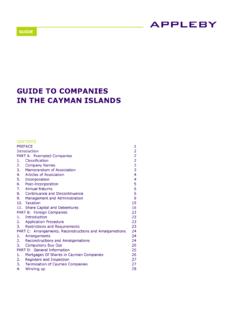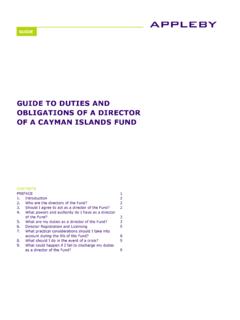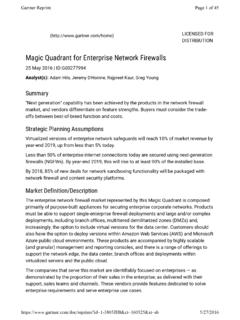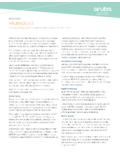Transcription of OFFSHORE ASSET PROTECTION TRUSTS AND FIREWALL AND ...
1 GIMME SHELTER! . OFFSHORE ASSET PROTECTION . TRUSTS AND FIREWALL AND. FRAUDULENT TRANSFER. LEGISLATION. by Ashley Fife Date 16 January 2018. To what extent are assets in OFFSHORE TRUSTS sheltered from claims made under other jurisdictions' laws against settlors, beneficiaries, trustees or trust property? Many OFFSHORE jurisdictions have experienced challenges drafting effective and appropriate FIREWALL legislation. Consequently, many jurisdictions have recently updated key aspects of their FIREWALL legislation. In contrast, the concept of ASSET PROTECTION TRUSTS and fraudulent transfer legislation may have received less attention recently.
2 From the perspective of Bermuda, this article considers factors relevant to protecting trust property from creditors' claims and further examines how conflict of laws rules work and the competing policy considerations and practical realities that OFFSHORE legislatures weigh up when developing conflict of laws rules applicable to TRUSTS . WHAT IS AN ASSET PROTECTION TRUST? A trust is not a legal person. An express trust is a fiduciary relationship whereby a person, the settlor, transfers property a trustee to hold and apply for the benefit of one or more persons or purposes in accordance with the trust's terms.
3 There is no legal definition of an ASSET PROTECTION trust under the law of Bermuda or in most other jurisdictions. An ASSET PROTECTION trust may be described as an express trust with specific terms that aim to protect the trust property from claims brought against the trust's settlor or beneficiaries. The ASSET PROTECTION qualities of the trust may also be influenced by the conflict of laws rules under the governing law of the trust. However, ASSET PROTECTION is rarely the sole reason why a person might wish to form a trust. Arguably, the overriding reason why TRUSTS remain attractive to private clients is the flexibility that they provide for long term succession planning.
4 Most jurisdictions permit TRUSTS to last for many years. Aside from TRUSTS over Bermuda land, Bermuda law TRUSTS established on or after 1 August 2009 can have an indefinite duration if the trust instrument permits it. As people are living longer, problems increasingly arise when individuals lose mental capacity and are for example, unable to exercise or properly exercise voting or other rights in relation to their assets, which may include controlling shareholdings in the family business. Serious delays may occur in circumstances where an individual's vote is required before the business can enter into an important transaction.
5 TRUSTS that provide trustees with discretionary dispositive and management powers can facilitate continuity when transitioning from one generation to the next. TRUSTS may provide flexibility to adapt to unforeseen circumstances without having to, for example, dispose of the assets or apply to a court for the appointment of a guardian, receiver, administrator or executor of an individual or an individual's estate. TRUSTS can also facilitate efficient tax planning. For example, persons whose family members may be moving from one jurisdiction to another might wish to ensure they do not unwittingly expose existing capital and future income and gains on such capital to taxation in the jurisdiction where they intend to become resident.
6 However, on occasions, depending on the settlor's tax residency and other circumstances, forming a trust may be unattractive for tax purposes. Back to ASSET PROTECTION . The nature of the claims with which a trust settlor may be concerned when considering whether to form a trust may include (among others): breach of contract or negligence claims from persons with whom the settlor or beneficiaries have transacted business;. forced heirship claims from the executors or administrators of the settlor or a beneficiary's estate, or from the settlor's spouse or children;. family provision or inheritance claims brought by a spouse, former spouse, child or other dependent of the settlor or spouse.
7 Claims brought by a former spouse of the settlor or beneficiaries based on community property rules;. divorce or separation proceedings from a former spouse of the settlor or a beneficiary; and claims brought by a bankruptcy receiver in connection with the winding up of an insolvent settlor s or beneficiary's estate. The following non-exhaustive list of factors is relevant to the ASSET PROTECTION qualities of a trust: The settlor should clearly intend to establish and the terms of the trust instrument should reflect the intentions of the settlor in respect of how the trust property is to be managed and distributed.
8 2. A trust that appears valid on its face may be at risk of being set aside if the trustee and the settlor had in fact intended for the trust to managed and distributed in accordance with the directions of the settlor from time to time rather than in accordance with the trust instrument i;. the governing law of the trust: applicable perpetuity periods; and applicable conflict of laws rules including FIREWALL legislation and fraudulent transfer legislation;. the settlor's financial position- a settlor who is insolvent or intends to transfer property into a trust to defeat the interests of creditors are vulnerable to being set asideii.
9 The nature of the property intended to be held in trust ( movable or immovable) and the jurisdiction where the property is situated;. the mental or other capacity of the settlor to transfer property into a trust;. the capacity of a settlor to transfer of property into a trust made during the settlor's life time ( an inter vivos transfer) may be treated different from testamentary transfers under applicable legislation;. is the trust property community property and does the settlor own or have capacity to transfer community property without the consent of his or her spouse under the applicable law.
10 Selection of an independent trustee in a jurisdiction other than where movable trust property is situated may make it more difficult for creditors to successfully access trust property to satisfy claims;. transfers by settlors directly to underlying companies of TRUSTS are less likely to benefit from FIREWALL legislationiii;. whether the applicable legal formalities to complete a transfer of property into the trust are complied with;. the types of claims that may be recognised and enforced under the laws of the jurisdiction where the trustee or trust property is situated;. the types of claims the settlor or beneficiaries may most likely be exposed to in the jurisdictions in which they are resident or otherwise connected.











